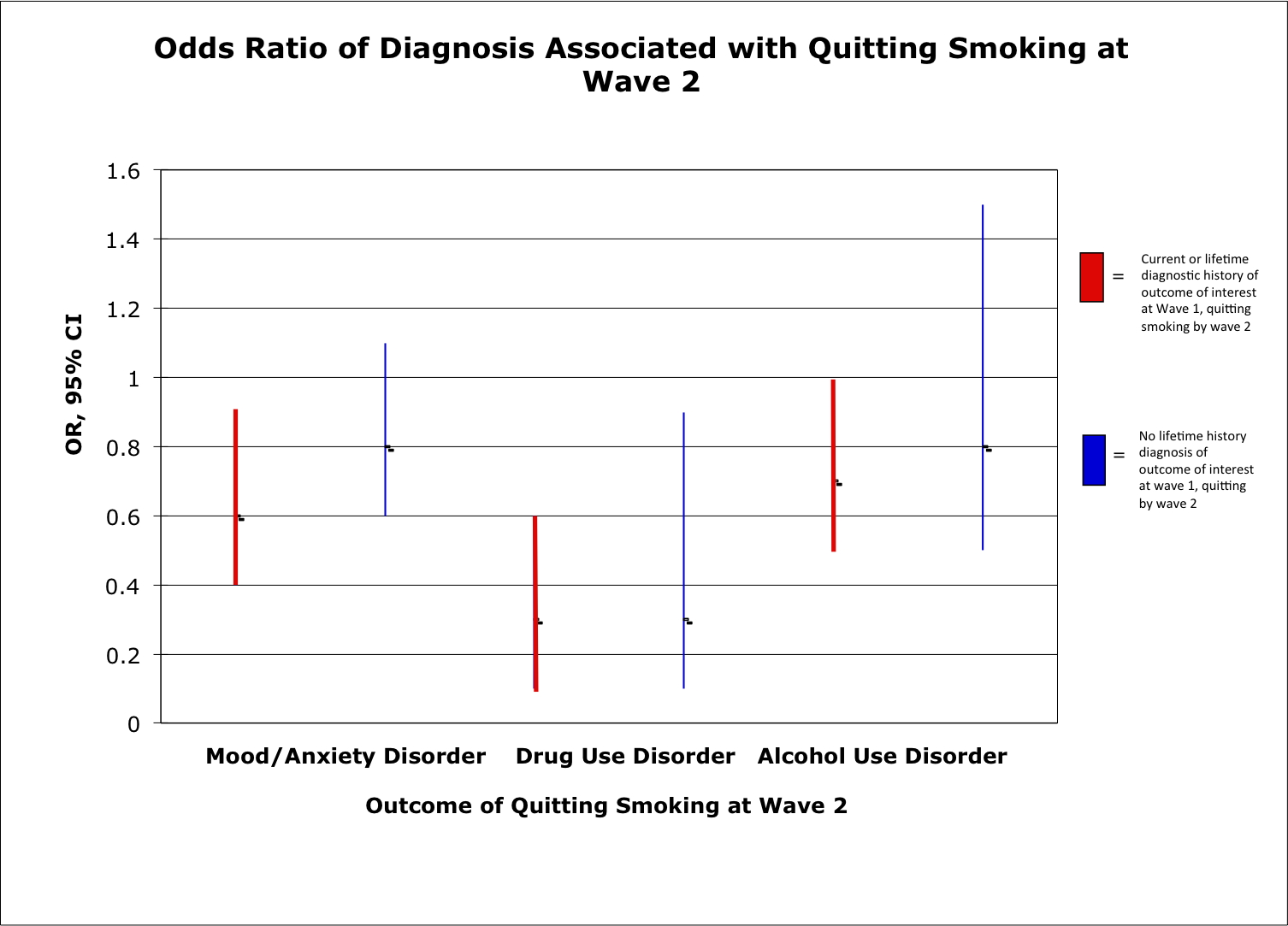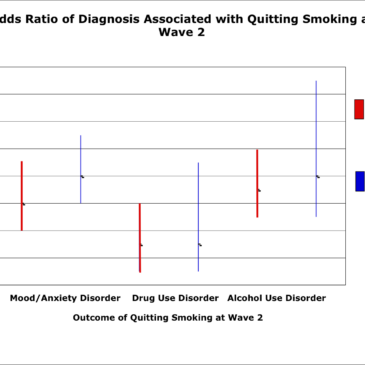Since many people smoke to self-medicate mood and anxiety symptoms, it is unclear whether attempts to quit or reduce smoking will lead to worsening symptoms for these people. In this edition of the DRAM, we review a recent article investigating the association between quitting or reducing smoking and rates of mood/anxiety and alcohol use disorders. Cavazos-Rehg et al. (2014) compare smoking cessation between two groups: individuals with and without pre-existing disorders.
Methods
- The researchers used data from the Longitudinal National Epidemiological Study of Alcohol and Related Conditions (NESARC: Grant, Stinson, Dawson, Chou, Ruan, & Pickering, 2004), a nationally representative sample of adults aged 18 years and older.
- Participants were eligible for the current study if (1) they reported smoking daily within the past year at wave 1, (2) their smoking patterns remained the same or decreased between waves 1 and 2, and (3) they completed an interview at Wave 2 (n=6,554).
- Measures included:
- percentage reduction in number of cigarettes per day from Wave 1 to Wave 2, categorized as (a) no or minimal (1–9%) reduction, (b) 10–49% reduction, (c) 50–99% reduction, and (d) 100% reduction; and
- lifetime diagnosis of mood/anxiety disorder, alcohol use disorder, and drug use disorder at Wave 1 and Wave 2.
- Researchers divided participants into two main groups:
- those who qualified for any of the three disorders at Wave 1; and
- those who did not qualify for any of the three disorders at Wave 1.
- Logistic regression analyses, run separately for each disorder and for the two participant groups, tested whether reductions in smoking predicted disorder status at Wave 2.
Results
- As the figure shows, among daily smokers who had a current or lifetime diagnostic history of the outcome of interest (i.e., mood/anxiety disorders, alcohol use disorder, drug use disorder) at Wave 1, quitting smoking by Wave 2 predicted a decreased likelihood of mood/anxiety disorder, alcohol use disorder, and drug use disorder at Wave 2.
- Among daily smokers with no lifetime diagnosis of the outcome of interest at Wave 1, quitting smoking by Wave 2 predicted a decreased likelihood of drug use disorder at Wave 2, but was not significantly associated with likelihood of mood/anxiety disorder or alcohol use disorder at Wave 2.
- In both groups, reducing (but not quitting) smoking was not significantly associated with likelihood of alcohol use disorder, drug use disorder, or mood/anxiety disorder.
Figure 1. Risk of Disorder at Wave 2 among those who Quit Smoking (adapted from P. A. Cavazos-Rehg, et al., 2014)

Please click on image for a clearer picture, or adjust your browser's zoom settings.
Note. Points on graph represent odds ratios. Lines represent confidence intervals. Odds ratios with confidence intervals that fall below one indicate a significant reduction in likelihood for the disorder, compared to those who did not quit smoking.
Limitations
- The length of the study might be an inadequate time frame to capture the pattern of major psychiatric illnesses accurately, which typically are episodic in nature.
- Participants who were able to quit smoking might have had less severe mental health problems, accounting for the decreased likelihood of disorder at Wave 2. Nonetheless, for these participants quitting did not appear to exacerbate comorbid issues.
Conclusion
Contrary to conventional assumptions that smoking cessation might lead to other drug use or higher prevalence of psychiatric symptoms, this study provides evidence against that argument. Among smokers with prior co-morbid disorders, quitting smoking was associated with reduced risk for mood/anxiety disorders and alcohol disorder. This study does not provide causal evidence of the relationship between smoking cessation and mood/anxiety disorders and alcohol use disorders. For example, individuals who have better control over their psychiatric illnesses might be better equipped to quit smoking. However, smokers have a high prevalence of alcohol or drug use disorder and mood/anxiety disorders (Kalman et al. 2005; Lawrence et al. 2009); therefore, the finding that quitting smoking is associated with improved mental health is important news, particularly for clinicians developing treatment plans for patients who smoke cigarettes and have comorbid disorders.
What do you think?
– Paige Shaffer
References
Cavazos-Rehg, P. A., Breslau, N., Hatsukami, D., Krauss, M. J., Spitznagel, E. L., Grucza, R. A., Salyer, P., Hartz, S. M., & Bierut, L. J. (2014: FirstView). Smoking cessation is associated with lower rates of mood/anxiety and alcohol use disorders. Psychological Medicine.
Grant, B. F., Stinson, F. S., Dawson, D. A., Chou, S. P., Ruan, W. J., & Pickering, R.P. (2004). Co-occurrence of 12-month alcohol and drug use disorders and personality disorders in the United States: Results from the National Epidemiologic Survey on Alcohol and Related Conditions. Archives of General Psychiatry, 61, 361–368.
Kalman, D., Morissette, S. B., George, T. P. (2005). Co-morbidity of smoking in patients with psychiatric and substance use disorders. American Journal of Addictions, 14, 106–123.
Lawrence, D., Mitrou, F., Zubrick, S. R. (2009). Smoking and mental illness: Results from population surveys in Australia and the United States. BMC Public Health, 9, 285.




